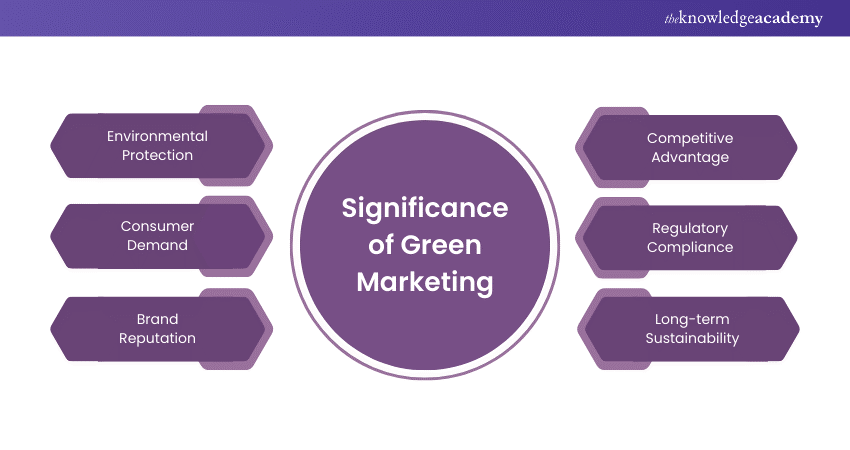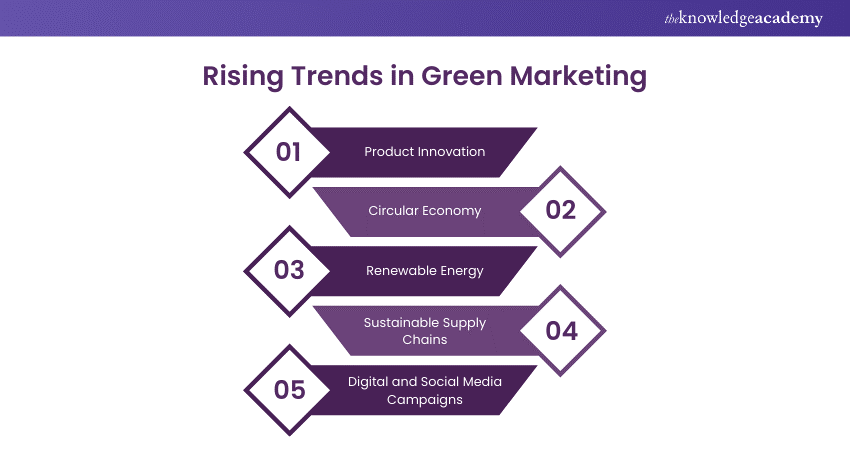We may not have the course you’re looking for. If you enquire or give us a call on +33 805638382 and speak to our training experts, we may still be able to help with your training requirements.
Training Outcomes Within Your Budget!
We ensure quality, budget-alignment, and timely delivery by our expert instructors.

Imagine stepping into a store and spotting products labelled as eco-friendly, sustainable, or green. Ever wondered why companies are embracing these practices? This is where Green Marketing comes into play. It involves promoting products and services based on their environmental benefits. But why is it becoming so popular?
Take, for example, a company that uses recycled materials for packaging. This not only reduces waste but also appeals to eco-conscious customers. Curious about the benefits of adopting Green Marketing strategies? Dive into this blog to discover more and transform your business!
Table of Contents
1) Highlighting What is Green Marketing?
2) Importance of Green Marketing
3) The 3 Ps of Green Marketing
4) Advantages of Green Marketing
5) Tips for Green Marketing
6) Examples of Green Marketing
7) The Growing Trend of Green Marketing
8) Conclusion
Highlighting What is Green Marketing?
Green Marketing is the marketing of products and services that are environmentally safe. This includes building in an environment-friendly space and delivering the products with minimum health hazards to humans. Natural components, waste reduction, resource conservation, and ecologically sustainable economic concepts are included. The need for Green Marketing is also to ensure transparency in communication and provide authentic evidence of commitment by the companies towards environmental responsibility.
Businesses use Green Marketing as a means of creating an image for themselves or to position their brand in the market due to one reason—to attract eco-conscious consumers, thus benefiting from sustainable development.
Importance of Green Marketing
Green Marketing is increasingly important in today’s world for several reasons. Let’s look at them in detail:

a) It promotes products and practices that are environmentally friendly, helping to reduce pollution, waste, and the overall carbon footprint.
b) There is a growing consumer preference for sustainable and eco-friendly products. Green Marketing helps businesses meet this demand and attract environmentally conscious customers.
c) Companies that adopt Green Marketing can enhance their brand image and reputation. Being seen as environmentally responsible can lead to increased customer loyalty and trust.
d) By differentiating themselves through sustainable practices, businesses can gain a competitive edge over those that do not prioritise environmental concerns.
e) As governments implement stricter environmental regulations, Green Marketing helps businesses stay compliant and avoid potential fines or sanctions.
f) Green Marketing encourages the development of sustainable products and technologies, contributing to the long-term health and well-being of the planet.
The 3 Ps of Green Marketing
The 3 Ps of Green Marketing—Passion, Purpose, and Precision—are essential components for creating effective and authentic Green Marketing strategies.
1) Passion
Passion is the driving force behind successful Green Marketing. Companies that genuinely care about environmental sustainability are more likely to create meaningful change and resonate with consumers. Passionate businesses go beyond mere compliance, actively seeking innovative ways to reduce their environmental impact.
This enthusiasm translates into authentic messaging, making it easier to connect with eco-conscious customers. For example, brands like Patagonia passionately advocate for environmental causes, which strengthens their relationship with their target market.
2) Purpose
Purpose in Green Marketing revolves around a company’s commitment to sustainability beyond profit-making. It involves aligning business goals with environmental and social responsibility. A purpose-driven approach ensures that all marketing activities reflect the brand’s dedication to eco-friendly practices.
Companies with a clear environmental purpose not only build trust but also inspire employees, partners, and customers to join their mission. For instance, brands like Tesla embody purpose by aiming to reduce reliance on fossil fuels through innovative electric vehicles.
3) Precision
Precision is about executing Green Marketing strategies with accuracy and clarity. It involves delivering clear, honest, and specific messages about the company’s green initiatives. Precision ensures that marketing claims are substantiated, avoiding misleading information that could lead to greenwashing accusations.
By communicating transparently about their sustainability efforts, companies can build credibility and avoid scepticism. A precise approach also involves setting measurable goals, tracking progress, and sharing results, fostering accountability and trust among stakeholders.
Advantages of Green Marketing
Green Marketing offers several advantages that benefit both businesses and the environment:
1) Attracts a New Market
Green Marketing attracts a new segment of consumers who prioritise sustainability and ethical practices in their purchasing decisions. This growing demographic, often referred to as eco-conscious or green consumers, actively seeks products that align with their values.
By catering to this market, companies can tap into new revenue streams and build a loyal customer base. Additionally, Green Marketing helps businesses stand out from competitors, enhancing brand differentiation in an increasingly crowded marketplace.
2) Boosts Profitability and Brand Loyalty
Adopting Green Marketing can boost profitability by enhancing brand loyalty. Customers are more likely to support brands they perceive as environmentally responsible. This loyalty translates into repeat purchases, positive word-of-mouth, and a willingness to pay premium prices for eco-friendly products.
Furthermore, companies that engage in Green Marketing can attract investors who prioritise sustainable business practices, leading to increased funding opportunities and long-term financial growth.
3) Reduces Overhead Costs
Implementing sustainable practices, such as energy-efficient production methods or waste reduction initiatives, can significantly lower operational costs. Green Marketing encourages businesses to optimise resource use, leading to cost savings in areas like energy, water, and raw materials.
For instance, companies that adopt sustainable packaging not only reduce environmental impact but also cut costs associated with traditional packaging materials. These cost savings contribute to improved profit margins while reinforcing the company’s green credentials.
4) Benefits the Environment
One of the most significant advantages of Green Marketing is its positive impact on the environment. By promoting eco-friendly products and sustainable practices, companies help reduce pollution, conserve natural resources, and minimise carbon footprints.

It also raises awareness about environmental issues, encouraging consumers to make more sustainable choices.
Tips for Green Marketing
To effectively implement Green Marketing, companies can adopt the following strategies:
1) Creating Sustainable Products
Design products with sustainability in mind by using eco-friendly materials, reducing energy consumption, and ensuring recyclability. Sustainable product design not only appeals to green consumers but also sets a company apart as a leader in responsible innovation.
2) Utilising Sustainable Materials for Production
Opt for renewable, biodegradable, or recycled materials in production processes. This reduces environmental impact and enhances product appeal among eco-conscious buyers. Sustainable sourcing demonstrates a commitment to responsible business practices, further boosting brand reputation.
3) Practicing Responsible Waste Disposal
Implement waste reduction strategies, such as recycling and composting, and ensure responsible disposal of non-recyclable materials. By minimising waste, companies can reduce their environmental footprint and demonstrate a genuine commitment to sustainability.
4) Investing in Social Media Marketing
Leverage social media platforms to promote green initiatives and engage with environmentally conscious consumers. Share stories about sustainable practices, eco-friendly products, and community involvement to build a positive brand image and foster connections with your audience.
5) Upgrading Equipment and Vehicles
Invest in energy-efficient equipment and eco-friendly vehicles to reduce carbon emissions and operational costs. This not only benefits the environment but also enhances brand credibility as a responsible, forward-thinking business.
6) Emphasising Your Company’s Eco-friendliness
Highlight your company’s green initiatives in marketing materials, packaging, and product labels. Clear, honest communication about your sustainability efforts builds trust and attracts customers who value environmental responsibility.
7) Supporting Environmental Initiatives
Collaborate with environmental organisations, participate in community clean-ups, or donate to eco-friendly causes. Supporting environmental initiatives demonstrates your company’s commitment to sustainability and helps build a positive, socially responsible brand image.
Examples of Green Marketing
Several companies have successfully implemented Green Marketing strategies, demonstrating the effectiveness of this approach:
1) Patagonia
Patagonia is renowned for its commitment to environmental sustainability. The company’s Green Marketing efforts focus on promoting sustainable product materials, advocating for environmental causes, and encouraging customers to buy less and repair more. Patagonia’s “Don’t Buy This Jacket” campaign highlighted the environmental impact of consumerism, challenging traditional marketing approaches and reinforcing the brand’s dedication to sustainability.
2) Starbucks
Starbucks has embraced Green Marketing by implementing eco-friendly practices across its operations. The company focuses on sustainable sourcing of coffee beans, reducing waste through reusable cups, and investing in renewable energy. Starbucks’ commitment to sustainability is prominently featured in its marketing campaigns, appealing to environmentally conscious customers and reinforcing its brand image as a responsible, community-focused business.
The Growing Trend of Green Marketing
The trend of Green Marketing is gaining momentum for several key reasons. Let’s talk about them:

a) Companies will develop innovative products using sustainable materials and technologies, such as biodegradable packaging and energy-efficient appliances.
b) Green Marketing will support the shift towards a circular economy, promoting products designed for reuse, recycling, and minimal waste.
c) As demand for renewable energy sources grows, Green Marketing will highlight the benefits of solar, wind, and other renewable energy solutions, encouraging consumer adoption.
d) Businesses will focus on creating sustainable supply chains that minimise environmental impact, with Green Marketing emphasising transparency and ethical sourcing.
e) Green Marketing will leverage digital platforms and social media to reach a broader audience, raising awareness about environmental issues and promoting sustainable lifestyles.
Conclusion
In conclusion, understanding “What is Green Marketing” reveals its pivotal role in fostering sustainable business practices and consumer habits. By prioritising eco-friendly products and ethical practices, Green Marketing enhances brand reputation and contributes significantly to environmental conservation.
Frequently Asked Questions

A Green Marketer develops and promotes strategies that highlight a company’s commitment to environmental sustainability. This includes creating eco-friendly products, reducing waste, and communicating these efforts to attract environmentally conscious consumers.

Green Marketing is generally positive as it encourages sustainable practices and appeals to eco-conscious consumers. However, it can be counterproductive if companies engage in greenwashing—misleading consumers about their environmental efforts.

The Knowledge Academy takes global learning to new heights, offering over 30,000 online courses across 490+ locations in 220 countries. This expansive reach ensures accessibility and convenience for learners worldwide.
Alongside our diverse Online Course Catalogue, encompassing 19 major categories, we go the extra mile by providing a plethora of free educational Online Resources like News updates, Blogs, videos, webinars, and interview questions. Tailoring learning experiences further, professionals can maximise value with customisable Course Bundles of TKA.

The Knowledge Academy’s Knowledge Pass, a prepaid voucher, adds another layer of flexibility, allowing course bookings over a 12-month period. Join us on a journey where education knows no bounds.

The Knowledge Academy offers various Marketing Courses, including the Strategic Marketing Course, Passive Income Course, and Marketing Research Training. These courses cater to different skill levels, providing comprehensive insights into Campaign Optimisation.
Our Digital Marketing Blogs cover a range of topics related to Strategic Marketing, offering valuable resources, best practices, and industry insights. Whether you are a beginner or looking to advance your Digital Marketing skills, The Knowledge Academy's diverse courses and informative blogs have got you covered.
Upcoming Digital Marketing Resources Batches & Dates
Date
 Strategic Marketing Course
Strategic Marketing Course
Fri 13th Dec 2024
Fri 21st Feb 2025
Fri 25th Apr 2025
Fri 20th Jun 2025
Fri 22nd Aug 2025
Fri 17th Oct 2025
Fri 19th Dec 2025







 Top Rated Course
Top Rated Course



 If you wish to make any changes to your course, please
If you wish to make any changes to your course, please


